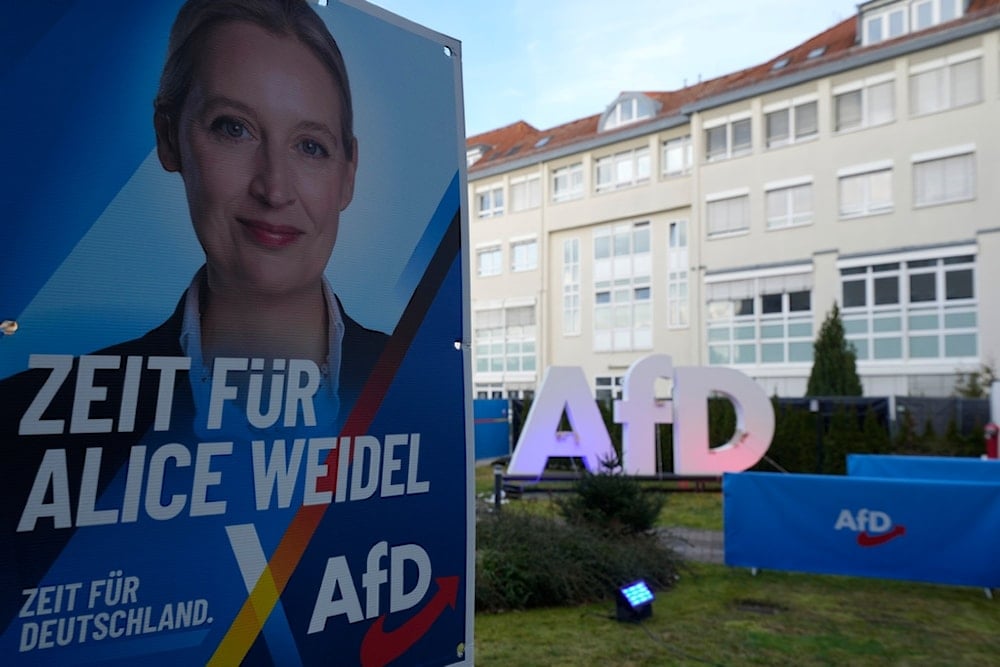German disapproval hits 67% while AfD rises to top of polls
New polls show rising frustration with Germany's CDU/CSU–SPD government, while the AfD emerges as the country's leading political force.
-

A poster with the leader of far far-right AfD Alice Weidel is placed at the AfD party headquarters in Berlin, Germany, Sunday, Feb. 23, 2025, during the German national election (AP Photo/Michael Probst)
Public dissatisfaction with Germany’s governing coalition has reached its highest level in months, according to a new INSA survey carried out for Bild, signaling deepening frustration only half a year after the country’s snap election.
The poll, conducted on November 6-7 among 1,005 respondents, found that 67% of Germans are unhappy with the government’s performance, the sharpest expression of discontent since May 2025. Only a quarter of respondents expressed approval, with just 24% saying they are satisfied with how the CDU/CSU-SPD coalition is managing the country.
Chancellor Friedrich Merz, who entered office promising steadiness after February’s election, is also facing mounting criticism. According to the survey, 64% of those interviewed are dissatisfied with his leadership, while 27% say they are happy with his work. His administration has been under pressure over a stalled economic agenda, divisions over the debt brake, and unpopular proposals on migration and deportations.
The public mood has also been shaped by a worsening economic backdrop. Germany has been stuck in a no-growth phase since 2019, with two consecutive quarters of zero expansion earlier this year. Unemployment recently climbed to three million, and energy and labor costs remain among the highest in Europe. Economy Minister Katherina Reiche has warned that the country faces a “serious situation” and that a durable recovery could take years. Analysts argue that the government has yet to present a convincing roadmap to reverse the downturn.
Foreign-policy tensions have added to the unease. Merz’s handling of arms exports to "Israel" during the Gaza genocide split his own bloc, while ongoing disputes with Brussels over migration and fiscal rules have portrayed Berlin as reactive rather than guiding European strategy.
A separate poll carried out between November 3 and 7 among 1,205 people indicates shifting political currents in the country. The right-wing Alternative for Germany (AfD) has moved ahead of all other parties, with 26% of respondents willing to vote for it. The CDU/CSU follows narrowly with 25%, while the center-left SPD continues its decline at 15%. Support for The Greens and The Left remains stagnant in the low double digits, leaving no clear path to a broad centrist majority.
Political Realignment
The rise of the AfD builds on its strong showing in the February snap vote, where it won a record 20.8%. That election placed the CDU/CSU first with 28.6%, while the SPD registered the weakest performance in its history at 16.4%. The conservatives subsequently formed a coalition with the SPD, bringing Merz to the chancellorship.
Since then, AfD support has continued to climb despite legal scrutiny, funding scandals, and the domestic intelligence service’s designation of the party as a right-wing extremist organization earlier this year. Analysts say that Germany’s political center is fragmenting under the weight of economic anxiety, migration debates, and a perception that mainstream parties have failed to deliver stability.
The new polling suggests the coalition is losing public confidence rapidly, with voters gravitating toward the AfD and reshaping Germany’s political landscape months ahead of key regional contests. Observers warn that if these trends hold, Germany could face its most dramatic realignment since reunification.
Read more: Germany placed as NATO’s main bridgehead in potential war with Russia

 4 Min Read
4 Min Read










